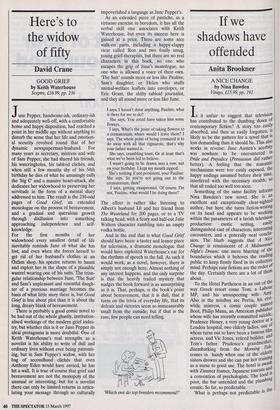Here's to the widow of fifty
David Crane
GOOD GRIEF by Keith Waterhouse Sceptre, £1699, pp. 236 June Pepper, handsome-ish, ordinary-ish and adequately well-off, with a comfortable home and happy disposition, had reached a point in her middle age without anything to disturb the sense that her life and emotion- al security revolved round that of her dynamic newspaperman-husband. For many years as secretary, mistress and wife of Sam Pepper, she had shared his friends, his wateringholes, his tabloid clichés, and when still a few months shy of his 54th birthday he dies of what he amusingly calls the 'big C' and a massive heart-attack, she dedicates her widowhood to preserving her servitude in the form of a mental diary addressed to him. The result is the 230-odd pages of Good Grief, an extended monologue on the process of bereavement, and a gradual and querulous growth through disillusion into something approaching independence and self- knowledge.
For the first months of her widowhood every smallest detail of life inevitably reminds June of what she has lost, and even when she forces herself to get rid of her husband's clothes at an Oxfam shop, his spectre returns to haunt and exploit her in the shape of a plausible wastrel wearing one of his suits. The trian- gular relationship between June, 'The Suit' and Sam's unpleasant and resentful daugh- ter of a previous marriage becomes the basis of what little story there is, but Good Grief is less about plot than it is about the long, dreary blank of bereavement.
There is probably a good comic novel to be had out of the whole ghastly, institution- alised workings of the modern grief indus- try, but whether this is it or June Pepper its ideal protagonist is more doubtful. One of Keith Waterhouse's real strengths as a novelist is his ability to write of dull and ordinary lives without ever being patronis- ing, but in Sam Pepper's widow, with her bag of secondhand clichés that even Anthony Eden would have envied, he has hit a wall. It is true of course that grief and bereavement are not the monopoly of the unusual or interesting, but for a novelist there can only belimited returns in articu- lating your message through so culturally impoverished a language as June Pepper's.
As an extended piece of pastiche, as a virtuoso exercise in boredom, it has all the verbal skill one associates with Keith Waterhouse, but even its success here is gained at a price. There are some nice walk-on parts, including a happy-clappy vicar called Ron and two foully smug, young grief-therapists, but there are no real characters in this book, no one who escapes the grip of June's monologue, no one who is allowed a voice of their own. `The Suit' sounds more or less like Pauline, Sam's daughter, or Helen who stuffs animal-welfare leaflets into envelopes, or Eric Grant, the shifty tabloid journalist, and they all sound more or less like June.
I says, I haven't done anything, Pauline, what is there for me to do?
She says, You could have taken him some flowers.
I says, What's the point of taking flowers to a crematorium, where would I leave them? I says, The whole point of being cremated is to do away with all that rigmarole, that's why your father wanted it.
She says, crumbling toast, Or at least that's what we've been led to believe.
I wasn't going to be drawn into a row, not on your birthday. I kept my mouth zipped.
She's nothing if not persistent, your Pauline: She says, So you're not going out to the crematorium, then?
I says, getting exasperated, Of course I'm not, Pauline, what would I he doing there?
The effect is rather like listening to Albert's husband Lil and her friend from The Wasteland for 200 pages, or to a TV talking head, with a feisty and half-cut Julie Walters character rambling into an empty vodka bottle.
And in the end that is what Good Grief should have been: a tauter and leaner piece for television, a dramatic monologue that would have exploited Waterhouse's ear for the rhythms of speech to the full. As such it would work; as a novel, however, there is simply not enough here. Almost nothing of any interest happens, and the only surprise is that the heavily trailed mystery that nudges the book forward is as unsurprising as it is. That, perhaps, is the book's point about bereavement, that it is dull, that it turns on the trivia of everyday life, that its defeats and victories seem so immeasurably small from the outside; but if that is the case, few people can need telling.
`Which one do top breeders recommend?'


































































 Previous page
Previous page